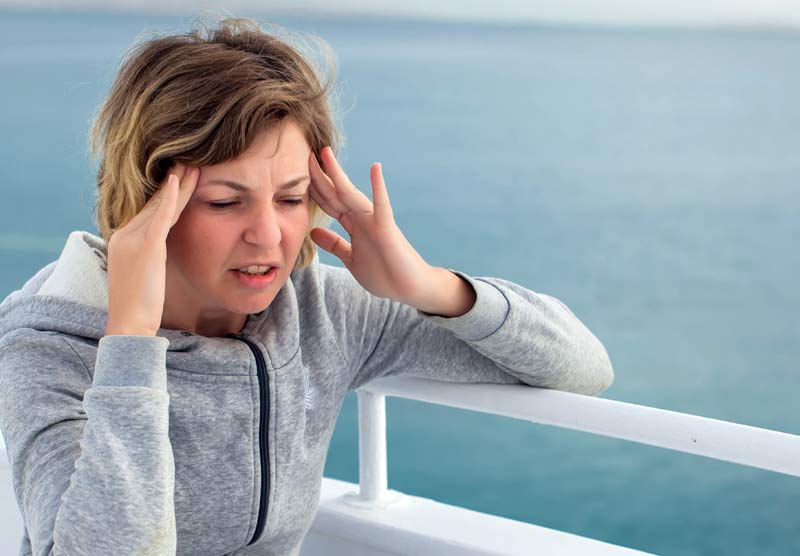
A bout with deep sea fishing sickness will quickly ruin what could have been a great day on the water. The good news, though, is that most people don’t get seasick. If, however, you’re one of those who do, there are several options for preventing sea sickness, or stop it in its tracks if it does strike.
What is Seasickness?
Seasickness, also known as motion sickness, happens most often to boat passengers. But, car, bus, and air travelers may also experience some degree of motion sickness, as well. No one is immune to motion sickness. However, children, pregnant women, and people taking certain medications seem to suffer from it more than others. Sea sickness strikes when your brain receives conflicting messages about what you see, and what you feel, while you’re in motion. The contradictory messages come when your inner ear – which controls your equilibrium – senses that you’re moving but, your eyes say you’re not. For example, when you’re sitting in a ship’s cabin reading a book or watching TV, your eyes are focused on something stationary, but your inner ear senses motion.
Deep sea fishing sickness often comes on quickly and may cause cold sweats, dizziness, nausea, and vomiting. Fortunately, some simple remedies exist to treat and even prevent sea sickness. Also, remember that some treatments work better at preventing sea sickness for some than others, so it’s always good to bring along a few options your first time out.
The Scopolamine Patch
The Scopolamine patch looks like a small, round band-aid. It goes behind your ear and lasts for up to three days. The Scopolamine Patch has been proven to be one of the most effective methods used for preventing sea sickness. For maximum protection, the makers recommend that you put the patch on the day before your fishing trip. Unfortunately, you will need to check with your doctor, as the patch is sold by prescription only.
Over the Counter Medications
Bonine works great for most people. Like the patch, it’s best to take a dose the night before you hit the high seas, and another dose in the morning, the day of. Dramamine also works well but may cause drowsiness. Bonine comes in chewable form and contains artificial sweeteners, while Dramamine pills are swallowed. Bonine costs a bit more but, one pill lasts all day whereas you may need several doses of Dramamine to get you through. CruiseCritic.com has a complete rundown on the pros and cons of each. The Scopolamine Patch, Bonine, and Dramamine all contain antihistamines.
Alternative Measures
If you prefer to take a more “natural” approach, consider Sea Bands. The soft and comfortable wrist bands use pressure point therapy to prevent motion sickness. While this treatment sounds a little “out there,” many users claim that Sea Bands actually work quite well. Some people also swear by ginger root, and with good reason. According to Healthline.com — “experts believe that compounds in ginger may work in a similar way to anti-nausea medications.” Ginger settles your stomach quickly and can also be combined with other remedies without fear of adverse side effects. The same goes for peppermint. Studies show that peppermint relaxes your digestive system, and helps relieve stomach spasms, as well. Most drug stores carry ginger or peppermint in supplement, candied, raw, or powdered form.
Eat Light and Eat Right
Don’t hit the breakfast buffet before heading out to sea. Eat like you already feel a bit queasy, your stomach will thank you later. Also, stay away from heavy foods (pancakes, French toast, waffles), greasy foods (bacon or sausage), and highly acidic foods (coffee, orange juice/grapefruit juice) the morning of your fishing trip. These foods digest slowly, and in the case of coffee, may cause dehydration. Stick with cereals, grains, bread, milk, apple juice, apples, bananas, and water. Be sure to eat but not to overeat.
A Few More Tips
- Don’t sit below deck or in the cabin reading, watching TV, or on your tablet for long periods. If you start to feel queasy, go above deck and get some fresh air.
- Get a good night’s sleep before you take to the waves. Being tired will make you more susceptible to seasickness.
- Stay hydrated. Dehydration leads to a variety of health problems, nausea, vomiting, and headaches, among them.
- Go easy on the alcohol the night before. Boarding a fishing boat with a hangover will not end well.
- Stand and look out over the horizon if you begin to feel nauseous. Sitting, or lying down, may make you feel worse.
- Bring dry crackers along. Just like at home, crackers can help to calm an upset stomach.
- Avoid passengers who have become seasick. Seeing others with motion sickness could also cause you to become sick, too.
If you are unsure of how your constitution will handle a day on the water, start small and work your way up. Try a half-day inshore trip. You might be pleasantly surprised to find that you’re tougher than you thought and that fishing is more fun than you thought, as well.
